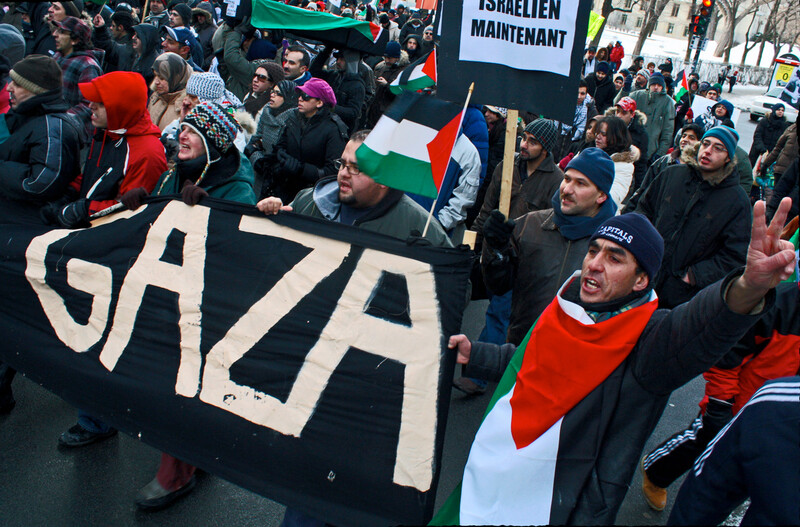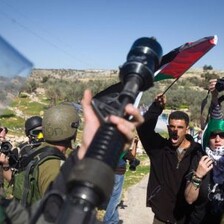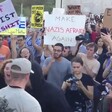The Electronic Intifada 16 November 2011

Palestine solidarity is one component of a wider struggle.
FlickrEarlier this month, the Polish Nationwide Organization of Jewish Youth, known as ZOOM, withdrew from an alliance of anti-fascist groups and cited the participation of the Polish Campaign of Solidarity with Palestine in the 11 November Coalition as the reason.
The Polish 11 November Coalition was formed last year to oppose a march through Warsaw by the extreme right. Groups such as the Camp of Great Poland and the All-Poland Youth have expressed anti-Semitic and homophobic sentiments, and have been linked to neo-Nazi groups.
The extreme right in Poland pursues a political agenda of “Poland for Poles only,” to the exclusion of other ethnic and cultural groups in the country. Warsaw annually celebrates Polish independence day on 11 November to commemorate the anniversary of achieving independent statehood in 1918, after 123 years of partition and occupation by Russia, Prussia and Austria.
The coalition is comprised of more than fifty anti-fascist and anti-racist organizations, trade unions, anarchist collectives and groups campaigning for gay, lesbian and transgender rights.
Palestine solidarity smeared as “anti-Semitic”
ZOOM withdrew from the coalition, labeling the Kampania Palestyna, a network of Polish and Polish-Palestinian activists with experience of solidarity work in Palestine, as “anti-Semitic.” Its statement of resignation has now been withdrawn from its website and other Internet forums, possibly due to the fear of litigation under Poland’s stringent slander laws.
ZOOM is not the first Jewish organization to withdraw from the coalition and to cite the presence of a Palestinian human rights campaign group as the reason.
In January last year, Czulent, an association of Jewish youth, withdrew from the coalition, arguing that it should be “apolitical.” Czulent stated on their website, “We cannot be passive in the face of anti-Semitic views hiding under the banner of anti-Zionism” (“Withdrawal from the 11 November Coalition,” 22 January 2010 [Polish]).
Czulent alleged that the organization of meetings for Ben White, contributor to The Electronic Intifada and author of the book Israeli Apartheid: A Beginner’s Guide by Kampania Palestyna, amounted to the promotion of “hate speech” and “holocaust denial.”
Academics and writers who edit the Polish Jews Forum — a website set up in 2004 by “individuals who do not subscribe to any political organization” living in Poland, the US and Israel — released a statement on 8 November 2011 declaring, “it is with satisfaction that we learned that Jewish organizations, which last year supported or belonged to the 11 November Coalition, comprising amongst others leftist and anti-Israel organizations, will not be participating this year. It is good that the Jewish community does not want to ennoble its participation in a coalition which contains an organization which supports Arab terrorism” (“Polish Independence Day - Beware?”, Polish Forums, 10 November 2011). The inference is that Kampania Palestyna’s solidarity with the Palestinian right of resistance is tantamount to supporting terrorism.
Conflating far-left and far-right
The editors of the forum went on to say that they opposed both the fascists and the left-wingers out on the streets on 11 November.
“We are against both one and the other. We disagree with their views — racist, anti-capitalist, anarchist, nationalist — represented in their xenophobic forms — neo-communist, neo-fascist, left-wing and also anti-Semitic and anti-Israel,” the statement added.
In their effort to depict all “isms” as extreme, and conflate anarchists and left-wingers with neo-Nazis, the forum has attempted to depoliticize the coalition, and negate understanding and analysis of the conditions which generate racism and fascism. Denying the political nature of racism and fascism — and the need for an analysis that reveals the political interests and processes that enforce racism — provides cover for powerful organizations, institutions, states, lobbyists and groups. It also allows oppression to go unexamined.
The Kampania Palestyna has risen to public prominence since its inception in mid-2009 following Operation Cast Lead, Israel’s all-out attack on Gaza in the winter of 2008-09. Since then, it has organized protests, direct actions and public meetings with Palestinian, Israeli and international activists including Sahar Francis from the Palestinian political prisoners support group Addameer, Jeff Halper from the Israeli Committee Against House Demolitions and Yonatan Shapira from Boycott from Within.
Influencing coverage of Palestine
Despite the attacks and slander, the campaign is pushing ahead and is able to influence media coverage and popular education on Palestine.
Kampania Palestyna’s work has influenced prominent Polish journalists, including broadcaster and writer Roman Kurkiewicz (a passenger on this year’s thwarted Gaza Freedom Flotilla II).
Kurkiewicz wrote in the General Weekly magazine that it was meeting Israeli conscientious objector and BDS activist Yonatan Shapira and activists from the Kampania which propelled him to take action on Palestine, after having previously believed Israel was a beleaguered democracy.
Perhaps the greatest asset of the Kampania is the editor of the Polish edition of the monthly Le Monde Diplomatique, Przemyslaw Wielgosz. Le Monde Diplomatique publishes articles on Palestine every month and Wielgosz has repeatedly spoken for the campaign both in front of cameras and in theaters, universities and squatted social centers around Poland.
The Kampania has also undertaken cultural activities by organizing Palestinian film festivals around the country with Kino Palestyna (Cinema Palestine), and translating Alberto Arce and Mohammad Rujailah’s award-winning “To Shoot an Elephant” documentary film on Israel’s attacks on Gaza in the winter of 2008-09, showing it in more than twenty locations across Poland.
Changing the discourse
The campaign has inspired political discourse previously dominated by Israeli embassy spokespeople and pro-Israel journalists. Campaign activists are regularly called upon to comment in mainstream print and TV media. Israeli officials and pro-Israel reporters had previously enjoyed a monopoly on media stories due to the absence of a Palestine solidarity campaign in the country, a low level of human rights oriented and investigative journalism.
Israeli government press releases have been simply re-produced unchallenged in the media, which is due to historic guilt harbored by successive Polish governments over Polish complicity in anti-Semitic policies and practices over the past century, both prior to the Second World War — and also in 1968 when the ruling communist party ran a campaign targeting prominent Jewish dissident students and party members, purging them and forcing the exile of thousands of others, under an “anti-Zionist,” anti-Semitic banner.
Following the fall of the Iron Curtain and the implementation of a capitalist system in the country, US influence was hegemonic and government policies followed those of the US, including blind allegiance to Israel and a foreign policy benefiting Israeli interests.
The group’s activists come from social justice, environmental activism, anti-fascist, trade union and community organizing backgrounds and have spent time in occupied Palestine.
Taking its lead from the 2005 Palestinian grassroots call for a comprehensive campaign of boycott, divestment and sanctions (BDS), Kampania also locates itself in a wider struggle for systemic change and for genuine participatory democracy and social, environmental and economic justice.
As such, the Kampania has been a driving force within the anti-fascist 11 November coalition, linking the motivations, structures and processes that reproduce occupation, colonization and racism at home and around the world. This is something that should be welcomed, not smeared.
Ewa Jasieiwcz is an activist and writer and member of the Polish Campaign of Solidarity with Palestine (Kampania Palestyna).





Comments
Poland's growing Palestine movement
Permalink Brian Curdy replied on
Keep up the good work, Ewa. We in Switzerland are with you.
Palestine Freedom Movement
Permalink Walter Niewiadomski replied on
Palestinians and the Palestine freedom movements are not anti-Semitic. It is Israel that is trying to tarnish a valid freedom movement by labeling all criticism of Israel as anti-Semitic. People need to realism that Israel is a civil state hungrey for land, resources and security. It has committed some egregious acts of land and home confiscations; demolitions; and continuing exploitation of the Palestinians. It is Israeli nationalism that has justified such violence against Arabs, not Judaism. Israel has ignored the many historic Jewish values of truth, justice, equality and tolerance for the sake of expanding Israel onto Arab land.
Well written
Permalink Muskens replied on
In the Netherlands we have to struggle aswell against a biased government in favor of israeli politics.
I can imagine that your struggle in Poland is much more complicated due to the past . It is very easy for the israelis to accuse you of so called anti semitism.
In the Netherlands we face sometimes the same problem, however we have the impression that in the meantime most people are aware of the true character of israel. When we distribute leaflets or organise a demonstration or are posting at a shop to urg epeople not to buy products coming from the westbank under the false label "produce of israel "we generally meet sympathy.
Your struggle is quite recent now. So I presume it will take some time to get the same sympathy with th epublic as here in the Netherlands.
Go on with the good work!
Regards Maarten Muskens The Netherlands
Poland
Permalink rosemerry replied on
Poland has been the provider of so many Jews to Israel, including Menachem Begin, that they should not be berated after all this time with the label of a-S because they support justice for Palestinians. Most people who are fair will do the same, and that includes many Jews and other supporters of Israel.